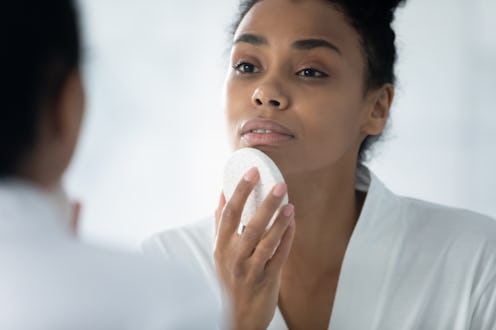(Skin Care)
PCOS & Acne — What You Need To Know
Dermatologists breakdown what the condition is and how it takes a toll on the skin.

Determining the cause of your acne can be enough of a frustrating task, but finding that there's ultimately no resolve from countless topical treatments can be even more emotionally taxing. That's often the case with Polycystic Ovarian Syndrome (PCOS) and acne. The condition is more common than people think, and in addition to menstrual irregularity, excess hair growth, weight gain, and more, it can also take a major toll on the skin.
"PCOS or Polycystic Ovarian Syndrome is a common disorder in young women in which there is an overproduction of male hormones, or androgens," Dr. Ife Rodney, board-certified dermatologist, says. "The hormonal imbalance causes painful, irregular periods and the development of cysts on the ovaries, hence its name. PCOS is the leading cause of infertility in women." But it also manifests itself physically, Dr. Rodney says. "In addition to infertility, PCOS increases the risk of a range of health issues including acne, weight gain, diabetes, high blood pressure, and heart disease," she continues.
So to better explain it, TZR tapped three knowledgable dermatologists to explain the effects of PCOS on the skin, how to differentiate its symptoms from traditional acne, and steps for treatment if you are living with the condition.
How Does PCOS Impact Skin?
According to Dr. Corey Hartman, dermatologist and founder of Skin Wellness Dermatology in Birmingham, AL, women with PCOS have an increase in male hormones known as androgens which can cause the body to produce excess sebum, leading to immensely clogged pores. "Cystic acne is very common among people with PCOS and can be painful or itchy since the infection goes deep into the layers of the skin," Dr. Marina Peredo, New York City dermatologist says. But that's not all. "It can also lead to insulin resistance that causes hyperpigmentation and thick plaques in the neck, groin, under the breasts, and under the arms called acanthosis nigricans," Dr. Hartman shares. "PCOS causes increased hair growth in the face and body as well as hair loss on the scalp. Skin tags and seborrheic dermatitis are also associated with PCOS."
Can PCOS Be Treated The Same As Traditional Acne?
"Most commonly, acne caused by PCOS is treated with oral contraceptive pills since they help balance out the hormones that are causing acne flare ups," Dr. Peredo says. "It can also be treated by using traditional methods for hormonal acne, but it is definitely more difficult to treat this type of acne since it is deeper in the skin than superficial pimples."
More than likely, however, a specialist will be needed, Dr. Hartman says. "PCOS requires collaborative treatment with a gynecologist to regulate the hormone levels and normalize the menstrual cycle and, in some instances, an endocrinologist to gain control of the insulin resistance and diabetes," Dr. Hartman says. "Once the metabolic syndrome is better controlled, traditional and topical treatments for acne and excess hair growth are more effective."
However, that doesn't mean that topical products are completely ineffective. "You can try to control acne caused by PCOS with products that contain retinol, which increases cell turnover and can help with scarring, but it can be harsh and irritating, so it is best to start off by using it only once a week," Dr. Peredo says. "You can also look for products that contain benzoyl peroxide which reduces the acne-causing bacteria on the skin, or prescription medications like Accutane. If you have scarring from acne, it can be treated with laser resurfacing or chemical peels." And that's not all. "Traditional acne treatments like salicylic acid and benzoyl peroxide can also help," Dr. Rodney says.
How Do You Know Your Acne Is Caused By PCOS?
"Acne is just one of the many ways that PCOS presents," Dr. Rodney says. "While hormonal acne usually appears on the jawline, chin, and neck, regular acne occurs anywhere on the face." However, hormonal acne may be seen in women who do not have PCOS. "These women may experience monthly flares in their acne," she continues. "With PCOS, you would likely have other symptoms like weight gain, and irregular periods." You may also be able to tell that you have PCOS based on your skin's reaction to topical treatments. "PCOS acne will also not respond well to over-the-counter acne treatment alone," Dr. Rodney says. "PCOS acne develops into deep, painful cysts that can leave scars."
PCOS Relief
"There is no cure for PCOS, but there are some steps you can take to relieve its symptoms," Dr. Rodney says. "For starters, a combination of diet, exercise, and stress reduction can help." And while oral contraceptives are often used to treat PCOS and the symptoms that come with it, if you are looking to improve the appearance of your skin and suffer from PCOS, Dr. Peredo says there are specific products that can render a bit of aid, specifically those with ingredients such as benzoyl peroxide and ceramides.
We only include products that have been independently selected by The Zoe Report's editorial team. However, we may receive a portion of sales if you purchase a product through a link in this article.
Shop PCOS Relief:
This article was originally published on